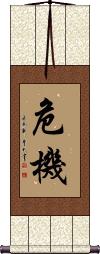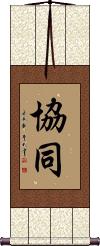Many custom options...
And formats...

Equals in Chinese / Japanese...
Buy an Equals calligraphy wall scroll here!
Personalize your custom “Equals” project by clicking the button next to your favorite “Equals” title below...
Crisis equals Danger plus Opportunity?
危機 means crisis in Chinese and Japanese.
Separately, the first character here does mean “danger” or “to endanger,” and the second character can mean “opportunity.”
However, I want to debunk a myth that was propagated by some westerners who did not have a clear understanding of Asian languages...
While often, Chinese/Japanese/Korean compound words (words of two or more characters) are the sum of their parts, this is not always the case. The compound is often understood with a completely different meaning than the two characters individually.
Many have said that the Chinese/Japanese/Korean word for Crisis is made up of the characters for “danger” and “opportunity.” 危機 is true when phrased this way.
However, it's not absolutely correct to say that “danger + opportunity = crisis” in Asian cultures.
English example:
If I tell you that...
Bovine creature + Guy behind the plate in baseball = Locomotive train protection
![]()
...you would think I was mad. But consider that “cow + catcher = cowcatcher,” which is the device that used to be found on steam engines to protect them if they hit an animal on the tracks. When we hear the word “cowcatcher,” we don't separate the words into their individual meanings (necessarily).
The same is true with the word for crisis in Chinese/Japanese/Korean. While you can separate the characters, few Asian people would automatically do so in their minds.
The final answer:
It is a half-truth to say, “danger plus opportunity equals crisis” in Chinese/Japanese/Korean. Use this statement and concept with caution.
Also, the second character can mean “secret” or “machine,” depending on context so I guess you have to say “a dangerous machine = crisis” or “danger + a secret = crisis.” Both of these are only slightly more ridiculous than the first premise.
PS: 危機 is probably not a great word for a scroll unless you have a special use for it.
Collaboration / Cooperation / Synergy
協同 is a Japanese, Chinese, and Korean word that means to cooperate, in coordination with, coordinated, collaborate, collaboration, collaborative, doing together (as equals).
Some will also use this as a short way to express the western idea of synergy (collaboration for a better result). There's a longer word, 協同作用, that adds “action” to this word and more directly means synergy.
Not the results for equals that you were looking for?
Below are some entries from our dictionary that may match your equals search...
| Characters If shown, 2nd row is Simp. Chinese |
Pronunciation Romanization |
Simple Dictionary Definition |
協同 协同 see styles |
xié tóng xie2 tong2 hsieh t`ung hsieh tung kyoudou / kyodo きょうどう |
More info & calligraphy: Collaboration / Cooperation / Synergy(n,vs,adj-no) doing together (as equals); sharing; common (land, etc.); joint (statement, etc.); cooperation; co-operation; collaboration; association |
即 see styles |
jí ji2 chi soku そく |
namely; that is; i.e.; prompt; at once; at present; even if; prompted (by the occasion); to approach; to come into contact; to assume (office); to draw near (adv,pref) (1) instantly; immediately; at once; (conjunction) (2) (usu. in negative sentence) equals; means; is; (3) {Buddh} oneness (of two opposing things); inseparability; (given name) Chikashi |
お主 see styles |
onushi おぬし |
(pn,adj-no) (archaism) you (when referring to one's equals or inferiors) |
これ see styles |
kore これ |
(interjection) (used to get the attention of one's equals or inferiors) hey; oi; come on; look; listen; (personal name) Kole; Kolle |
七慢 see styles |
qī màn qi1 man4 ch`i man chi man shichiman |
The seven pretensions or arrogances 慢 asserting superiority over inferiors and equality with equals, 過慢 superiority over equals and equality with superiors, 慢過慢 superiority over manifest superiors, 我慢 egotism or overweening pride, 增上慢 vaunting assertion of possessing the Truth, 卑慢 vaunting one's inferiority (or false humility), and 邪慢 vaunting lack of virtue for virtue. |
兆周 see styles |
zhào zhōu zhao4 zhou1 chao chou |
megacycle (MC), equals 1,000,000 Hz |
其許 see styles |
sokomoto そこもと |
(1) (archaism) that place; there; (pn,adj-no) (2) you (usu. used by samurai when speaking to their equals or inferiors) |
千周 see styles |
qiān zhōu qian1 zhou1 ch`ien chou chien chou |
kilocycle (KC), equals to 1,000 Hz |
吾ら see styles |
warera われら |
(pn,adj-no) (1) we; us; (2) (archaism) I; me; (3) (archaism) you (referring to a group of one's equals or inferiors) |
吾等 see styles |
wú děng wu2 deng3 wu teng warera われら |
(literary) we; us (pn,adj-no) (1) we; us; (2) (archaism) I; me; (3) (archaism) you (referring to a group of one's equals or inferiors) |
彼ら see styles |
karera かれら arera あれら |
(pn,adj-no) they (usually male); them; (noun - becomes adjective with の) (1) (kana only) those (indicating something distant from both speaker and listener, or something understood without naming it directly); (2) (archaism) they (of people) (used to refer to one's equals or inferiors) |
彼等 see styles |
bǐ děng bi3 deng3 pi teng hitō かれら |
(pn,adj-no) they (usually male); them; (noun - becomes adjective with の) (1) (kana only) those (indicating something distant from both speaker and listener, or something understood without naming it directly); (2) (archaism) they (of people) (used to refer to one's equals or inferiors) such as that |
御主 see styles |
onushi おぬし |
(pn,adj-no) (archaism) you (when referring to one's equals or inferiors) |
御辺 see styles |
gohen; onatari ごへん; おんあたり |
(pronoun) (archaism) (polite language) (usu. used by samurai to their equals or people of slightly higher standing) you; (surname) Onbe |
我ら see styles |
warera われら |
(pn,adj-no) (1) we; us; (2) (archaism) I; me; (3) (archaism) you (referring to a group of one's equals or inferiors) |
我等 see styles |
wǒ děng wo3 deng3 wo teng ga tō われら |
we; us (archaic) (pn,adj-no) (1) we; us; (2) (archaism) I; me; (3) (archaism) you (referring to a group of one's equals or inferiors) we |
抗禮 抗礼 see styles |
kàng lǐ kang4 li3 k`ang li kang li |
to behave informally as equals; not to stand on ceremony |
等侶 等侣 see styles |
děng lǚ deng3 lv3 teng lü tōro |
Of the same class, or company; fellows, equals. |
等号 see styles |
tougou / togo とうごう |
{math} (See イコール・2) equals sign; equality sign |
等號 等号 see styles |
děng hào deng3 hao4 teng hao |
(math.) equals sign = See: 等号 |
貴公 see styles |
kikou / kiko きこう |
(pronoun) you (primarily used by males when addressing their male equals or inferiors); (personal name) Takahiro |
貴君 see styles |
kikun きくん |
(pronoun) (polite language) you (primarily used by men in letters to their equals or inferiors) |
貴殿 see styles |
kiden きでん |
(pronoun) (1) (honorific or respectful language) (used by men in letters to male equals or superiors) you; (pronoun) (2) (archaism) (honorific or respectful language) your residence |
身共 see styles |
midomo みども |
(pronoun) (archaism) (used when speaking to one's equals or inferiors) I; me |
過慢 过慢 see styles |
guò màn guo4 man4 kuo man kaman |
The pride which among equals regards self as superior and among superiors as equal; one of the seven arrogances. |
わごれ see styles |
wagore わごれ |
(pronoun) (archaism) (familiar language) (used when speaking to one's equals or inferiors) (See わごりょ) you |
其の許 see styles |
sonomoto そのもと |
(exp,pn) (archaism) (used toward one's equals or inferiors) you |
其処許 see styles |
sokomoto そこもと |
(1) (archaism) that place; there; (pn,adj-no) (2) you (usu. used by samurai when speaking to their equals or inferiors) |
我勝慢 我胜慢 see styles |
wǒ shèng màn wo3 sheng4 man4 wo sheng man gashō man |
adhimāna; the pride of thinking oneself superior to equals. One of the 九慢. |
イコール see styles |
ikooru イコール |
(adjectival noun) (1) equal; equivalent; (2) {math} (See 等号) equals sign; equality sign; (expression) (3) equals (as in "A equals B"); (personal name) Igor |
Click here for more equals results from our dictionary
The following table may be helpful for those studying Chinese or Japanese...
| Title | Characters | Romaji (Romanized Japanese) | Various forms of Romanized Chinese | |
| Crisis equals Danger plus Opportunity? | 危機 危机 | kiki | wēi jī / wei1 ji1 / wei ji / weiji | wei chi / weichi |
| Collaboration Cooperation Synergy | 協同 协同 | kyou dou / kyoudou / kyo do | xié tóng / xie2 tong2 / xie tong / xietong | hsieh t`ung / hsiehtung / hsieh tung |
| In some entries above you will see that characters have different versions above and below a line. In these cases, the characters above the line are Traditional Chinese, while the ones below are Simplified Chinese. | ||||
Successful Chinese Character and Japanese Kanji calligraphy searches within the last few hours...





